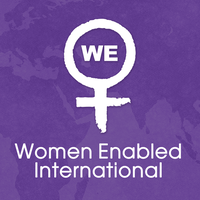COVID-19 at the Intersection of Gender and Disability
In March 2020, Women Enabled International (WEI) identified a gap in initial global responses to COVID-19: many actors were discussing how to include women and persons with disabilities in the response, but few were considering the unique experiences of women with disabilities and others living at the intersection of gender and disability. At the same time, we were hearing from local advocates that they were distressed about the situations in their countries and had concerns about the impact of this crisis on women with disabilities in particular, especially with respect to violence, access to health goods and services, and meeting basic needs. As such, WEI created the WEI COVID-19 Survey (Survey) to better understand these issues and how the lives of women, girls, non-binary, trans, and gender non-conforming persons with disabilities were being impacted by the COVID-19 crisis.
One hundred women, non-binary, and trans persons with disabilities across the globe responded to this Survey, which asked respondents to identify concerns they had about healthcare, violence, support services, income, and education. Survey respondents identified that their mental and physical health was being negatively impacted by this crisis, that they feared healthcare shortages combined with discrimination would mean they would not receive needed care if they were to become sick, that they were having trouble meeting their basic needs, and that many were in fear for their personal safety.
These are all issues that many women, girls, non-binary, trans, and gender non-conforming persons with disabilities experience in their everyday lives, often due to stigma, stereotypes, and discrimination at the intersection of gender and disability. The COVID-19 pandemic has amplified these abuses, and we hope this report will bring these issues out of the shadows.
This report first provides a summary of the Survey, including its methodology, the characteristics of respondents, and its limitations. The report then summarizes findings from the Survey related to health, meeting basic needs, and violence, presenting the voices of the respondents in their own words as frequently as possible, backed up by limited secondary research and a summary of human rights obligations related to these issues. The report concludes with recommendations to States, U.N. agencies, healthcare systems, and violence service providers about how to ensure that issues at the intersection of gender and disability are included in COVID-19 responses moving forward.
Click here to read the full report.
Source: https://womenenabled.org/blog/covid-19-survey-findings/
